Alumni Spotlights: getting to know our CS graduates
There is no question that the Department of Computer Science is home to amazing faculty, staff, and students. I wanted to provide an opportunity for those inside and outside the department to learn about what our Alumni are doing past graduation. The Alumni Spotlight provides a platform for CS graduates to share unique backgrounds, experiences, and stories. After reading, I know that you will agree- our graduates are incredible.
Thanks for reading! - Martin Marquez, Director of Academic and Support Services
Rebecca Faust
Rebecca "Becca" Faust earned a Ph.D in Computer Science from University of Arizona in December 2021. Originally from Missoula, Montana, Becca chose to attend the UA after her "job plans fell through" and she decided to look at masters programs - "a couple of years of grad school couldn't hurt." A phone call from Prof. David Lowenthal and a visit to the campus - getting a good sense of the department culture and community- solidified her decision.
After graduation, Becca went to Virginia Tech as a post-doc and is now an Assistant Professor at Tulane University in New Orleans, Louisiana. Becca chose to join the Tulane University faculty because of the emphasis on interdisciplinary work. When reflecting on her time at UA, Becca fondly recalls her peers - "there was a really good grad student culture". Becca's favorite memories: the first time she gave a talk at a conference (IEEE VIS 2018 in Berlin, Germany - see Becca's talk) and the weekly grad student lunches.
Becca's advice to Ph.D. students (and everyone): "having [a] support network, people to vent to, people to take your mind off bad research days...rejected papers...is critical."
Lee Savoie
Lee Savoie earned a Ph.D. in Computer Science with from the University of Arizona in August 2019. Originally from Texas, Lee decided to attend the UA due to it being "the closest university of note" in his plans to pursue a Ph.D. Lee had a great time at UA, specifically trips to connect with others and learn about research going on in the field.
Lee has been working at Voltaiq for 4 years and is Principal Software Engineer at Voltaiq. Voltaiq is a startup focused on battery analytics software. The work is "often solving problems around managing large volumes of data for [battery] tests."
Lee's interview with Prof. David Lowenthal includes advice that Prof. Lowenthal once shared with Lee and now Lee shares: "Fail fast - if you got a cool idea or something, the best thing to do is to find the fastest possible way to see if there's any possibility that it might work so that you don't invest months and months of time into something thats going to end up....not having any interesting results or anything...try to prove it out as quickly as possible."
Vatsav Sethupathi
Vatsav Sethupathi earned a BS in Computer Science from University of Arizona in December 2023. Originally from a small town in India, Vatsav considers Tucson his hometown. He decided to attend the University of Arizona in large part because of the generous scholarships and the faculty research opportunities. Vatsav was originally planning to pursue chemistry as his choice of major, but a project during his last year in high school helped him realize his passion for CS.
Vatsav was involved in several activities while at UA including being a CS undergraduate teaching assistant (UGTA) , CS Buddy Mentor, and doing research. While these activities provided Vatsav with opportunities to find community within the department, it was a CS faculty member, Russell Lewis, who helped Vatsav feel comfortable taking on those activities. Vatsav remembers his TA work as some of his favorite memories while at UA.
As a quality engineer, Vatsav tests audio policies on Apple devices. Vatsav tests volume scenarios and "I try to break stuff" as part of his role. He initially applied to an internship at Apple during his first year at UA, but didn't think much of it. Fast forward a couple of years and Apple reaches out to him asking if he would be interested in an internship! Vatsav's internship experience during his senior year at UA was a stepping stone to his position. Vatsav's advice to students looking to get a position at Apple: "apply early...reach out to people...stay curious...don't think something is out of reach for you."
When not working, Vatsav is getting back to his best tennis form. A little known fact, Vatsav used to play profession tennis in India!
Giulia Ghidoli
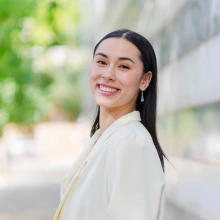
Giulia Ghidoli earned a Bachelor of Science in Computer Science and a Bachelor of Fine Arts in Dance, with a minor in Spanish from the University of Arizona in May 2023. Originally from Laguna Hills, California, Giulia resides in Tucson as a Software Engineer at Ascending Node Technologies. When Giulia is not busy working, she enjoys baking : "I love to bake! I make tarts, cookies, pies, etc. The best part is sharing with others."
Why did you decide to attend the University of Arizona?
I was drawn to the University of Arizona primarily because of their esteemed dance program–I had been dancing for most of my life and wanted to continue in college.
Why did you select computer science as your major?
Coming to the university, I knew I wanted to double major with a field in STEM. I landed on computer science since it combined my interest in technology with my love for problem-solving.
What did you enjoy most about your experience at UA Computer Science?
I had a blast being a teaching assistant for the introductory courses. I enjoyed helping students learn the fundamentals and start their path in CS.
What is your favorite memory of your time at University of Arizona?
I had a coffee blog with my roommate Vaisha where we’d review local coffee shop around Tucson. We’re both big coffee lovers and got to explore the fantastic coffee scene here.
Tell us about your current position/role (what do you do what excites you about it). How did you get there? Why is this role important?
I am a software engineer at Ascending Node Technologies, where I develop the flight software for the Aspera Pioneers Mission at Steward Observatory. I started as a student intern on the mission and have been fortunate to continue full-time after graduating. It’s exciting for me to collaborate with other scientists who are passionate about their work.
What advice would you give a student looking to get into your field? Position/role?What advice would you give a student looking to get into your field? Position/role?
Always be willing to learn. You’ll never know everything you need to for this field, so listen carefully and ask lots of questions. One of the best things about CS is the amount of resources available at your fingertips!
What advice would you give to a student considering CS at UA?
CS is an expansive field–find a topic you like and explore it. Go to office hours and discuss projects with your peers. There’s so much to learn, don’t be overwhelmed–it’s exciting!
What advice would you give to a student already pursuing CS at UA?
Besides starting projects early (seriously), the most important skill you’ll learn is to debug. Be persistent and you’ll always learn something from the process.
Katy Williams
Katy Williams earned a MS (December 2019) and PhD (May 2023) in Computer Science from UA.
Originally from Apex, North Carolina, Katy chose to attend the University of Arizona because of the strong CS program and the change in scenery - she earned her BS in Computer Science from Davidson College (Raleigh, NC). An avid swimmer, Katy qualified for the 2016 Olympics trials and was preparing to do it again in 2020 (before they were postponed due to the pandemic).
Katy returned to her alma mater of Davidson College as an Assistant Professor of Mathematics and Computer Science. Watch Katy's interview with Prof. David Lowenthal as they discuss Katy's experience in our UACS program, favorite memories while at UA, and shared this advice to current CS students : "build community" and "don't be afraid to ask for help."
Alec Scott
Alec Scott earned a Bachelor of Science in Computer Science with a minor in Mathematics from the University of Arizona in May 2022. A Flagstaff, Arizona native, Alec decided to pursue computer science at UA, in part because of someone he knew, scholarship/financial benefits, and the well-funded high performance computing (HPC) program.
Since graduating, Alec has been working as a Computer Scientist at Lawrence Livermore National Laboratory, which is one of the top places to carry out work in high-performance computing.
Alec's interview with Prof. David Lowenthal includes a description of Alec's experience at UA, including a shoutout to the content learned in CSC 452, and the memories while in the department. He shared this piece of advice for current CS students : "try to pursue opportunities outside of class."
Connor Brett
Connor Brett earned a Bachelor of Science in Computer Science with a minor in Information, Science, Technology & the Arts (ISTA) from UA in 2022. Since graduating, Connor has been working as a Software Engineer at Google in Seattle, Washington.
Originally from Campbell, California, Connor chose to attend the University of Arizona in part because of the warm weather and exposure to a diverse community - with lots of school/sports spirit. He knew during high school that CS was his area of interest - friends and family (including his dad) were already in or on their way to CS related careers.
While at UA, Connor fondly remembers the CS Tutor Center. He started using the CS Tutor Center and eventually worked in the CS Tutor Center - first as a tutor and later as a Tutor Coordinator.
Connor enjoyed CSC 473 - Automata, Grammars and Languages - with Dr. Anson and the passion and enthusiasm Dr. Anson conveyed in that class.
As a Google Software Engineer (under Google Cloud), Connor works on a team to improve and launch new products under Google Cloud. He originally started working at Google through internships during his UA sophomore year. Attending various events/opportunities prepared Connor for his current role.
Connor leaves viewers with this advice/anecdote : "If you are the smartest person in the room, find another room" - surround yourself with top talent so you can grow.
During his free time, Connor raises and trains puppies to become guide dogs.
Samantha Mathis
Samantha Mathis earned two degrees from the University of Arizona : Bachelor of Science in Computer Science and a Bachelor of Arts in French with a minor in Information, Science, Technology in May 2022. A local Tucsonan, Samantha originally decided to attend the UA to pursue a degree in chemistry. Samantha decided to attempt CSC 110 (Introduction to Computer Programming I) the summer after her first year and liked it. She hasn't looked back since.
Since graduating, Samantha has earned a MS in Software Development from Boston University (May 2024) and has been working at Raytheon in Tucson. She recently earned a promotion to Software Engineer II, working on software and hardware (and even some firmware).
In reflecting on her experience while at the University of Arizona, Samantha highlighted her involvement in the CS UGTA program (specifically serving as a Course Coordinator for CSC 110) as an enjoyable/memorable experience. Her favorite memory included the grading sessions with peer CS UGTAs and the bonds made during those events - "it was just fun to be in the environment with the other TAs - having fun."
View Samantha's interview as discusses her experience at UA, including the faculty that had a positive impact on her. She shares advice for moving up in industry and for students just starting/already at UA pursuing CS.
Morgan Comrie (Henry)
Morgan Comrie (Henry) earned a Bachelor of Science in Computer Science with a minor in Mathematics from UA in 2019. Morgan's dad, Tyson Henry, earned a PhD in Computer Science from the UA in 1992 (check out our 50 Years of Computer Science, including a list of PhD Alumni). Morgan was sold on attending the UA after receiving an advertisement in the mail and visiting campus. Her exposure to computer science started early on - enrolling in dual enrollment courses and being excited about programming assignments.
Morgan was one of the first tutors working in the CS Tutor Center - an exciting initiative to provide additional support to UA CS students- and eventually became a Tutor Coordinator, a leadership position reserved for the best of the best. Morgan has fond memories while at UA including being a tutor and a resident assistant (RA)- the camaraderie and fun on campus. Morgan highlighted CS faculty member, Dr. Michelle Strout, as an influential faculty member who helped create a sense of community among women in CS through "Women in Computer Science Tea" and initiatives to send CS students to the Grace Hopper Celebration (GHC). Morgan points out that she was able to get a position at GoDaddy, in part to attending GHC. Morgan shares what she does as a Software Development Engineer at GoDaddy. She also shares advice for students looking to work for GoDaddy (and industry in general) and making the most of your time at UA by getting involved.
Morgan was our Spring 2024 Department of Computer Science Convocation alumni speaker and shared motivational advice to our graduating students. You can also read more about Morgan's experience on the GoDaddy Life entry.
Anh Nguyen Phung
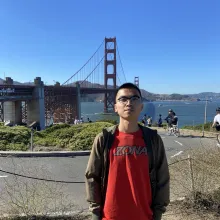
Anh Nguyen Phung earned a Bachelor of Science with three (yes three!) majors: 1) Computer Science, 2)Mathematics with a Computer Science Emphasis, and 3) Statistics and Data Science. Anh completed his majors and became a UA CS alum in May 2023. From Hanoi, Vietnam, Anh is currently working as a Software Engineer at Two Sigma. During his free time, Anh enjoys watching and playing a variety of sports and computer/console games. Read Anh's responses to our interview questions, below.
Try your best. If you fail, just try again. One day it will somehow magically work
Shreyas Khandekar
Shreyas Khandekar earned two degrees in Spring 2023: Bachelor of Science in Computer Science and Bachelor of Science in Business Administration in Management Information Systems. In this spotlight interview, Shreyas shares his experience and memorable moments while at the University of Arizona. He calls out a few UA CS Faculty including Dr. Mihai Surdeanu, Melanie Lotz, and Dr. Eric Anson, as some of the best people. Shreyas reflects on the benefits of being involved in the department, including being a CS Buddy Mentor. In addition to discussing his experience at UA, Shreyas discusses his work as a Software Engineer and working on the team creating/developing a new programming language- Chapel. Shreyas did a lot while he was at the University of Arizona, including sitting for a final to play a joke on a faculty member! Check out Shreya's interview (closed captions included in the video).
Daniel Marashlian
Daniel Marashlian earned a Bachelor's of Science in Computer Science with a minor in Mathematics in Spring 2004. Originally from Sedona, Arizona, Daniel decided to attend the University of Arizona in pursuit of a Computer Science degree because UA offered a pure software focused CS degree. During his time at UA, Daniel enjoyed the sense of community on campus and received guidance from Dr. Patrick Homer on post-graduation options. Daniel initially worked at Rio Salado Community College building Learning Management Systems. That experience made Daniel realize how much he would rather work as his own boss - leading him to start eight companies! He is currently serving as the Co-Founder and Chief Technology Officer for Drata - helping companies automate their security compliance programs.
Transcript of the interview can be found here.
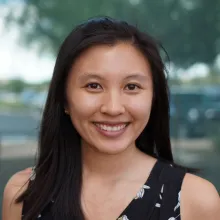
Heidi Lee
Heidi Lee obtained a Bachelor's of Science in Computer Science in Spring 2019.
1. Why did you decide to get a BS in CS?
Admittedly, computer science was not something I knew much about nor something I considered myself passionate about. Although I initially did not know what I wanted to study coming into my freshman year of college, I had slight exposure to the field and naturally had continued the path. Sooner or later, I found myself taking the next course in the curriculum and eventually, a diploma in hand.
2. Why did you come to UA CS?
I chose UA primarily for the Wildcat Excellence Award. With the scholarship and being able to live with my sister, how could I have passed on such an opportunity!
3. What are the three most memorable things in your time at UA CS?
The most memorable things during my time at UA CS would all mostly boil down to my time as a section leader. I enjoyed the people I would interact with- ranging from the faculty, other section leaders, and the students. It was a great experience being there for other students and lend a helping hand when needed. I miss that, and being able to hang out with my friends after classes. Another fond memory I have would be sitting in the ninth floor atrium and enjoying that beautiful view- Tucson mountains are something else!
4. What are you doing now?
I am a software developer at General Motors. I have been here for 3 years and have been on several different teams and working on a wide variety of projects.
5. Tell us something interesting about yourself (unique skills, experiences; expertise - think of something that a viewer/reader would be surprised to know about you).
As someone who used to grind day and night for my assignments and exams in school, I have learned to take a step back. I value a good work life balance and a great company culture. As a result of this, in addition to the work I have at GM, I am an avid participant in our events and resource groups we have here. I assisted in hosting some of the events we would display at the office, and have been able to meet a lot of wonderful people outside of my team.
6. How do you feel about your experience at UACS and how it prepared you for your current job/career?
Overall, I had a great time at UA CS. Although some of the late nights were brutal, I enjoyed being able to study with friends. The courses have prepared me for the interview, especially with data structures and algorithms. Besides the interviews, the program helps with problem solving and structures one's way of thinking for this field.
7. What advice would you give a student interested in CS?As much as you hear others preaching about starting projects early, it is a great habit to get into. Gain an understanding of the project specs early on, ask your TA/professor questions, and make friends with the people in your class- you'll be seeing a lot of the same faces throughout your time in college.
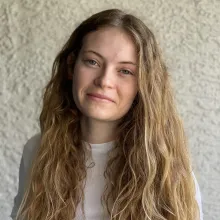
Kaylee Price
1. Why did you decide to get a BS in CS and why did you come to UA CS?
I started at the U of A as an undecided major. My friend was taking an introductory CS class, CS 101, and I decided to join in since it was something I had never done before, and since it could help me in my search for a major. I absolutely loved it! After that semester, I decided to join UA CS on a path towards graduating with a BS in CS.
2. What are the three most memorable things in your time at UA CS?
My first CS class, CS 101, sparked my interest in CS. We learned beginner topics in software and even a little about a wide variety of CS topics like web development and computer hardware. This class was the first stepping stone in my career path, and perhaps one of the most memorable.
One of my most memorable courses was Databases. That class was so different from most of the other courses, and it was refreshing to learn something that connects so many different CS topics. Learning about the back-end was complimentary to the front-end you learn in Web Development and even complimentary to Software Development in many ways. I have ended up using what I learned in this course much more than I thought I would.
Aside from my most memorable CS course, the atrium in Gould-Simpson was one of the most memorable parts of my CS major. The atrium overlooks almost the entire campus, and is where you could always find someone working on a similar topic. We had many study sessions, late night homework sprints, and even free coffee in the atrium.
3. What are you doing now?
I currently work as a Full-Stack Software Engineer for a web accessibility company. Our mission is to eradicate barriers to digital access.
4. Tell us something interesting about yourself (unique skills, experiences; expertise - think of something that a viewer/reader would be surprised to know about you).
I have had a professional role in three extremely different areas: IT, embedded software engineering, and web/full-stack development.
5. How do you feel about your experience at UACS and how it prepared you for your current job/career?
UA CS set a solid foundation for my career in Software. It taught me how to most efficiently learn new CS topics (because there are a lot). I had to learn completely new concepts at my first job and in my current job, but the foundation laid by my CS degree from UA has allowed me to quickly immerse myself into whatever new challenge lays ahead.
6. What advice would you give a student interested in CS?Practice, practice, practice. Learning new topics and starting new projects will always be the best learning strategy, especially because you get to decide to practice the things you're most interested in. This can end up teaching you what topics you're most interested in and help you decide what you might want to do with your degree.
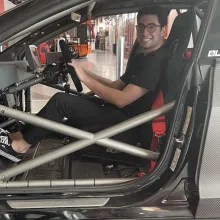
Daniel Ryngler
1. Why did you decide to get a BS in CS?
I decided to get a BS in CS after taking AP CS my senior year in high school. I originally came to the UA as a business major but added CS as a second major as soon as I arrived. I fell in love with the idea of being able to build whatever I want, whenever I want.
2. Why did you come to UA CS?
I came to UA because my brother was here, and I had a bunch of friends from home joining me!
3. What are the three most memorable things in your time at UA CS?
(1) Writing my first C program with Vim
(2) Sitting in upper division classes and having the concepts I was exposed to pre-major beginning to truly “click”
(3) Participating in research with the CS vision lab
4. What are you doing now?
I interned at Tesla as a software engineer during my junior year spring and summer semesters (February 2021 – August 2021). While at Tesla, I worked on the Finance Automation team. I utilized my strong CS fundaments, learned throughout my time at UA, to automate the behind-the-scenes processes that happen when a customer buys a car in order to make it a quick and seamless process. My work involved knowledge of programming in Python and C#, databases, and working with remote servers (thanks for the practice lectura!).
5. Tell us something interesting about yourself (unique skills, experiences; expertise - think of something that a viewer/reader would be surprised to know about you).
During my senior year, I worked on a super interesting computer vision project with the CS vision lab. Using deep learning, we developed a plant disease segmentation model on drone imagery and ended up publishing a research paper on it!
6. How do you feel about your experience at UACS and how it prepared you for your current job/career?
Based on my career experience so far, my time at UACS has prepared me very well! I’ve learned all the fundamentals I need to be able to be a smart and efficient programmer as well as now have a strong foundation to build from and learn new technologies. CS 445 (Algorithms) helped tremendously with interviews.
7. What advice would you give a student interested in CS?
Take everything step by step and don’t be discouraged if some things seem super complicated (almost like it’s magic!). As you progress throughout your time in CS and are exposed to topics multiple times, all the confusion (and jargon) begins to make sense and you realize CS really isn’t that complicated!
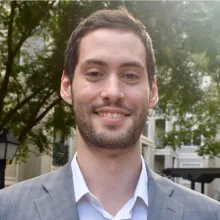
Victor Gomes
1. Why did you decide to get a BS in CS?
I grew up using computers, playing video games and my dad works as a software engineer. All of that inspired me to try computer science, once I started programming I actually enjoyed the creative problem solving aspect of it a lot.
2. Why did you come to UA CS?
I knew I wanted to go to one of the schools in Arizona, University of Arizona seemed to have the best Computer Science program from my research.
3. What are the three most memorable things in your time at UA CS?
The most memorable was definitely being a teacher assistant (aka section leader) for 3 years and becoming a SL coordinator my last year. The amount of friends and things I learned during that program made it so much fun. Another was the process of working super hard on the projects and passing CSc 352: Systems Programming & Unix, was the hardest class I took. It felt amazing to pass it. Third was getting together with friends and classmates to attempt the HackArizona hackathon every year, spending all nighters coding to build something cool.
4. What are you doing now?
I am a Front-end Software Engineer at Blackrock. And build lots of web projects on the side.
5. Tell us something interesting about yourself (unique skills, experiences; expertise - think of something that a viewer/reader would be surprised to know about you).
I have created my own generative art NFT project called Lucid Paths with a few friends from U of A.
6. How do you feel about your experience at UACS and how it prepared you for your current job/career?
I loved my experience at UACS, working on most of the programming projects was very satisfying, and I am still proud of a lot of them. I especially liked the opportunity of being a TA, teaching and helping other students made me learn a lot. It also helped me build a lot of the soft skills necessary to do well in a tech career. I will say having to learn assembly language was tough!
7. What advice would you give a student interested in CS?
Try to keep a good GPA, but in my experience having the best GPA is not everything, be sure to participate in extracurricular opportunities, try to learn outside class and build your own personal projects that interest you, and learn tech interview skills.
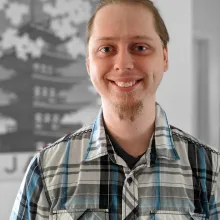
Aaron Alexander
1. Why did you decide to get a BS in CS?
Growing up I was always the best in my family when it came to dealing with computers. I was fascinated with them as tools and wanted to learn more about how they work. Funny enough I had imagined "Computer Science" as more hardware-focused, but learned very quickly that it was mostly software-focused, but fell in love regardless.
2. Why did you come to UA CS?
The University of Arizona was in the perfect spot for me. I was born and raised in Phoenix and greatly wanted to leave the nest to pursue education, but I'm also a homebody and didn't want to be TOO far away. It also worked out that my sister was living in Tucson, so I still had family close by. The program and its wonderful staff were just stars that aligned perfectly in my favor.
3. What are the three most memorable things in your time at UA CS?
Being an Undergraduate TA: Having the opportunity to help guide and inspire students new to the program is an experience I'll never forget.
That first spark of "I understood that!": Everybody has this moment. You reach a point where you won't need to ask for assistance and when your code just works it's the most gratifying feeling in the world.
Long nights renting out a room in the library: Whether it's group study sessions, or working on homework by yourself, the solitude and beautiful views of the library were always a great source of comfort.
4. What are you doing now?
Right now I am a Software Engineer at American Express. I work in Machine Learning and Big Data platforms.
5. Tell us something interesting about yourself (unique skills, experiences; expertise - think of something that a viewer/reader would be surprised to know about you).
Before pursuing my CS degree, my closest ties to understanding advanced software was digital music production. I still enjoy making music in FL Studio to this day and you'd be surprised what you understand about your favorite bits of software after pursuing a CS degree.
6. How do you feel about your experience at UACS and how it prepared you for your current job/career?
I think that the best of any college program does it's best to give you a catch-all understanding of the broadest topics so that you will be prepared to handle anything specific you may be interested in. I think UACS did a great job of doing that for me. Just keep in mind that whenever you start your first day of actual work, there's a big chance that you will need to relearn some things. That's ok, you made it this far, you can do it again.
7. What advice would you give a student interested in CS?
Try not to get too caught up on the little things and continue to strive to do better the next time. It can seem very easy to feel like it's time to give up because you aren't good enough, I promise you that is never the case. Some of the best things in life require you to fight for it, and now is the perfect time to do so. You are here for yourself and you need to feel like you deserve this. A strong drive and a heavy commitment to improvement will carry the weight of any difficulty.
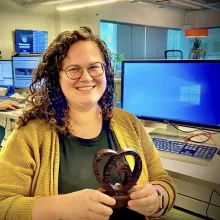
Meredith Larabee
Meredith Larabee earned a Bachelors degree in Computer Science in Fall of 2019. She is originally from Tucson, AZ and moved to Tempe, AZ to work as a Software Development Engineer at GoDaddy. Prior to earning her degree in CS she obtained a bachelors degree in Chemistry and a master's degree in Educational Leadership and Policy from the University of Utah. During her time as a CS student, Meredith worked as a section leader for CSC 110 and a course coordinator for CSC 120. She also served as the Vice President of the Women in Information and Computer Science club (WICS). Outside of school she loves to cook, travel, watch tv, and listen to podcasts.
Every faculty member I took a course from and worked for in the CS department had a huge impact on me. I think I went to the office hours of every professor I had at least once, and they were all kind, knowledgeable, and very invested in my learning process and the subjects they teach.
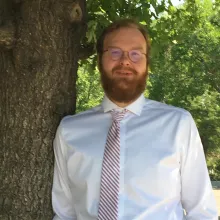
Benjamin Gaska
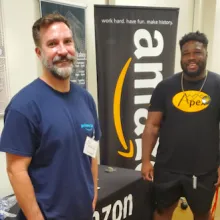
Tom Marthaler
Tom Marthaler graduated from the undergraduate program at the University of Arizona in May 1999 with a double major in Computer Science and Physics. Tom started his career in the defense industry doing ocean science research and working on satellite systems. He transitioned to doing web analytics and data mining for advertising startups which landed him at Amazon where he has worked on fulfillment system optimization and promotions validations.
1. What is your current occupation? How long have you been in that role?
Hi! My name is Tom Marthaler. I graduated from the undergraduate program at the University of Arizona in May 1999 with a double major in Computer Science and Physics. I started my career in the defense industry doing ocean science research and working on satellite systems. I transitioned to doing web analytics and data mining for advertising startups which landed me at Amazon where Iâve worked on fulfillment system optimization and promotions validations.
My current title at Amazon is Senior Software Engineer working out of the Amazon Tempe Software Center located in Downtown Tempe, AZ right on Tempe Town Lake. Iâve been at Amazon for 2.5 years, where Iâve been able to transition between leading a team as a Software Development Manager as well as focusing on individual software deliverables as a software engineer.
2. How did the UA computer science program prepare you for a career in computer science?
The main thing that the UA computer science program taught me was to force myself to understand complex computational problems. Before studying CS, I had focused on scientific computing and numerical methods. I had never really understood hardware issues or dove into language structure. I struggled through CS252 (a C is still a passing grade!) and learned how compilers and computation language design worked in CS453 (I still have fond memories of âlexâ and âyaccâ). My degree from the UofA CS curriculum created a foundation for me to understand any computational issue, from building AWS databases, algorithmically optimize supply chain systems and build machine learning models on huge datasets.
3. What advice would you give recent graduates looking to get into your field/area?
Coursework does not always prepare you for the tech interview process and preparing for the tech interview does not always prepare you for being successful in tech. If you want to work at a large tech company, the long and short of it is that practicing âwhiteboardâ (and their on-line equivalent) interview questions is required. If you want to be successful as a software developer in tech though, you need practice building software systems. The skills that you learn building software systems and practicing leetcode questions are definitely not the same. My advice would be to study leetcoding questions enough to pass an interview, but focus on creating a real application. What you learn building, deploying and maintaining(!) a real application will help you out tremendously in the long term and you will learn skills that are not taught in any lecture.
4. What sub-field(s) in computer science excite you?
The thing that excites me is not a Computer Science sub-field, but rather the application of current technology to non-technical domains. There is tremendous impact to be made without the need for cutting edge research, just applying computational automation to a series of everyday problems to make life better for everyone. The technology that already exists can be used in tremendously impactful ways across a gamut of social, civic, educational issues; someone that understands software computation and hardware creation just needs to get creative building solutions! As a CS student, there are a ton of ways to volunteer for this as well - participate in one of the hackathons around campus (HackAZ is every January!) or checkout social media for ways to help out.
5. Are there any faculty that you would like to recognize as having an impact on you (personally, academically, etc.)? If so, how did they have an impact on you?
The main faculty that had an impact on me was one not directly in the Computer Science department. I participated in a Federal Work Study program as an undergraduate for 2 years working in the College of Architecture. I had the opportunity to work with Dr. R. Brooks Jeffery, a professor of architecture, to bootstrap the image data in the Imagen database[itâs still operational at http://imagen.arizona.edu/. This required many hours in the College of Architecture archives performing manual data capture and data correction, but at the end of my work study program all of the Architecture archives were digitized and searchable. The data-focused skills and attention to detail learned on that job under Dr. Jeffery have lead to a successful career in data science and software.

